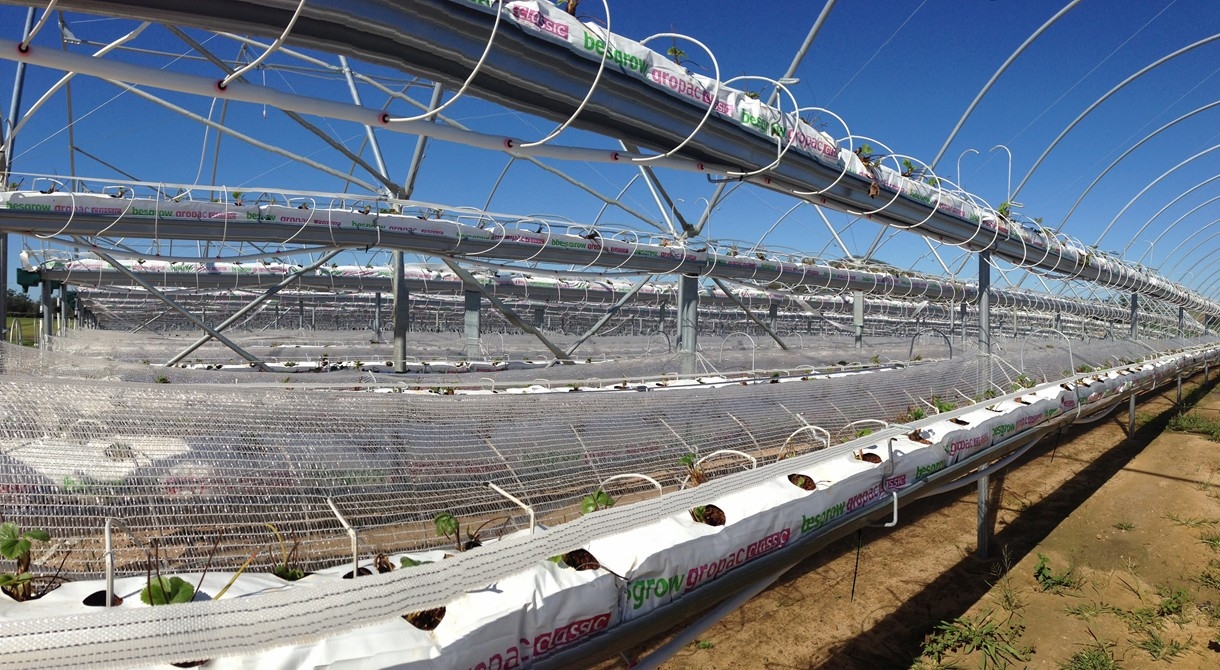Leading Australian strawberry producer, Piñata Farms, will for the first time produce substrate strawberries in polytunnels at its Wamuran farm on the Sunshine Coast this winter.

Managing director Gavin Scurr said while commercial substrate production was in its infancy in Australia, Piñata Farms believed it would become widespread in the next 10 years.
"Set-up costs for substrate and polytunnel production are extremely high. However, we've decided to make the move now, so when the rest of the industry goes that way, we will have already trialled and refined these methods," Mr Scurr said.
He said Piñata Farms had invested more than $1 million in erecting 1.5 hectares of polytunnels at Wamuran and another eight hectares at Stanthorpe in southern Queensland as part of its strawberry business expansions. Wamuran produces the winter crop and Stanthorpe the summer crop, resulting in year 'round production.
Substrate production to achieve efficiencies
Approximately 60 per cent of strawberries within the new polytunnels at Wamuran will be trialed using the substrate method this season.
Substrate strawberries are produced in a coconut husk growing medium in bags on tiered shelves raised off the ground.
"This winter, we'll be trialling all the varieties we currently grow to see which performs best in the tunnel environment," Mr Scurr said.
"We're expecting substrate production will improve fruit quality and achieve efficiencies. The tunnels will keep fruit dry, so there will be less waste and, because it will be warmer in the tunnels, we're expecting a moderate increase in yield.
"Substrate production takes the ground out of play, so plants won't be waterlogged or susceptible to soil-borne pests and diseases. It's a sterile environment which should result in a more uniform crop."
Mr Scurr said he expected substrate harvesting to be up to 40 per cent faster than field-grown picking.
"Our pickers will be able to stand and move along the benches as they pick, placing the berries into trays on a moving trolley," he said.
"We also expect to use about 30 per cent less water compared with the field-grown crop. Substrate strawberries will be irrigated through spike drippers set up in individual growing bags. Plants will be watered at four-minute intervals up to 10 times a day, depending on the weather."
Mr Scurr is also hoping for a 20 per cent saving on the amount of fertiliser used with the new production method.
The polytunnels were covered in clear polythene which diffused light and was more conducive to strawberry production, he said.
"Over time, the covers will become dusty and start to break down, blocking out too much light. We're hoping to get three seasons out of them before we need to replace."
Mr Scurr said while substrate strawberry production was minimal in Australia, it was the widespread in other parts of the world such as Europe due to degradation of soils.
"Europe doesn't have the sun to sterilise the soil like we do in Australia, so we're ahead of the curve in that sense. However, there is plenty of work being done on substrate and polytunnel production here and we're predicting it's the future for major commercial growers."
Winter harvesting of field-grown fruit began at the Wamuran farm in May - several weeks earlier than usual due to an unseasonally warm autumn.
Harvesting is expected to reach full production (seven days a week) in August, continuing through until October. Piñata Farms will pack approximately 140,000 punnets a day during the peak period - a 15 per cent increase on last year's output - due to a 16-hectare expansion at Wamuran.
Polytunnels increase at Stanthorpe farm
Once harvesting ends at Wamuran, the Stanthorpe farm will begin picking its summer crop. Piñata Farms grows strawberries over 10 hectares at the Stanthorpe farm. Eighty per cent of the crop is now covered in polytunnels and about one hectare will be devoted to substrate production this coming season.
Piñata strawberries are available at leading supermarkets in Queensland, New South Wales and Victoria.
